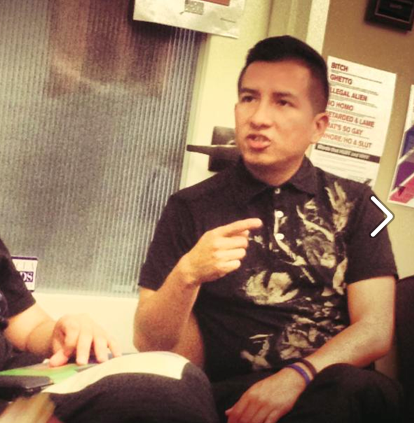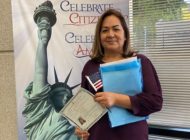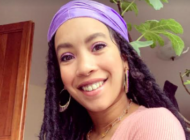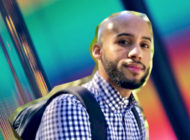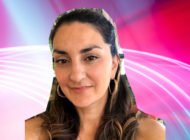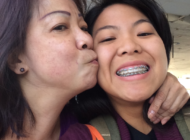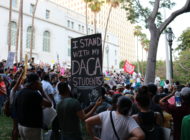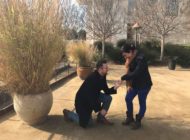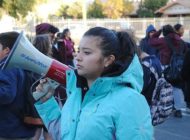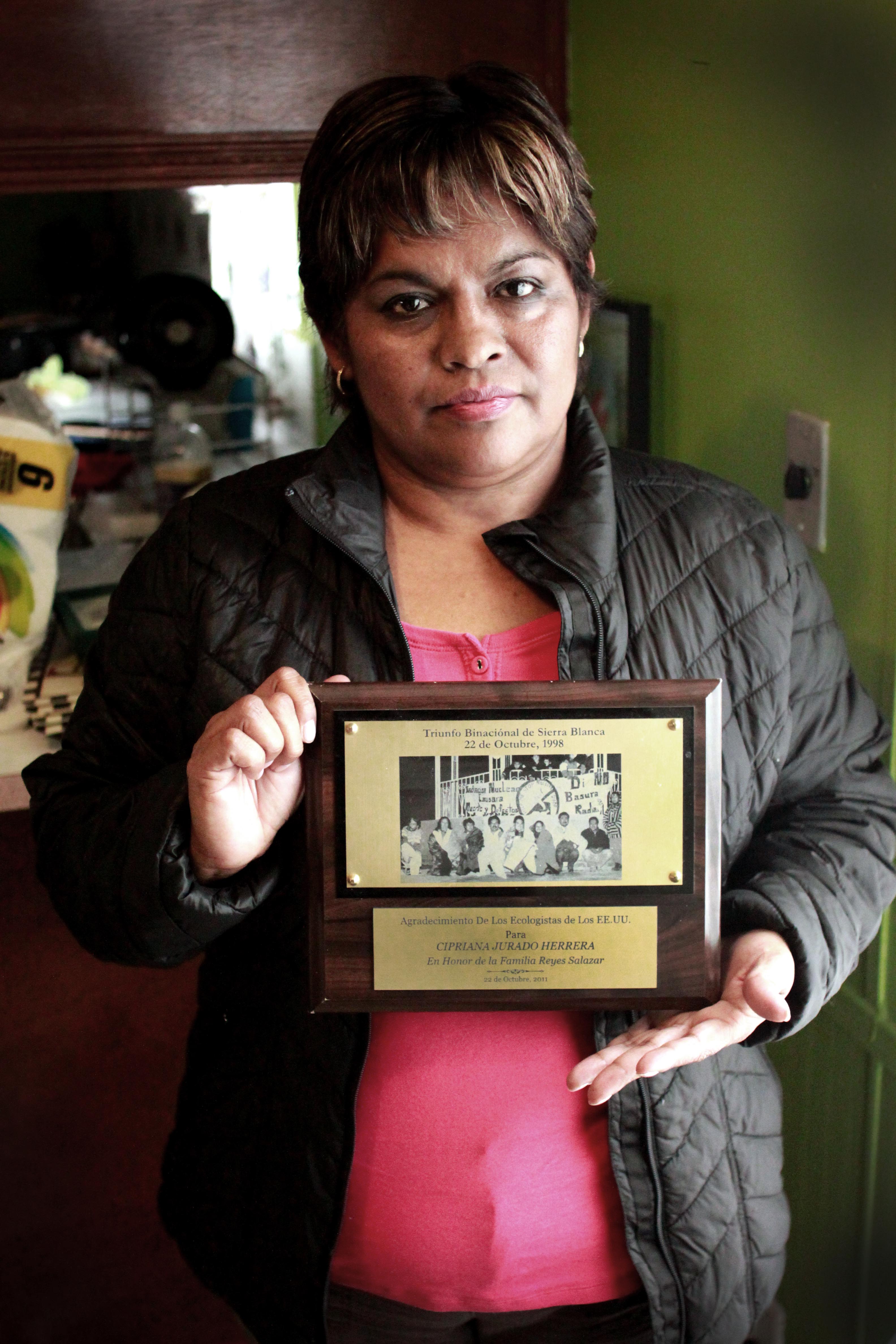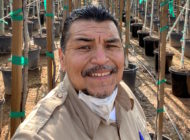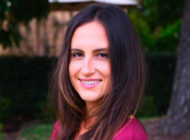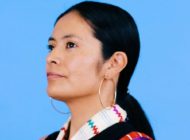By ASHLEY SOLEY-CERRO
EL NUEVO SOL
David’s story is common, but it often goes unheard.
This is because, for him, coming out does not only include personal consequences, but also legal ones. For this reason, the pseudonym David will be used in place of his real name.
As an undocumented student from El Salvador, talking about his experiences and struggles is often hard for other Americans to understand. And before programs like the DACA (Deferred Action for Childhood Arrivals), there was no legal defense against those who did not think he belonged in this country.
From an outsider’s perspective, David may appear to have it pretty good. At 20 years old, he is in his sophomore year at UCLA, he holds a leadership position on campus, and while being gay is still taboo in some places, it is increasingly being accepted in America, especially in cities like Los Angeles.
But David, and the 11.7 million other undocumented immigrants in the U.S., cannot have a bank account, a social security card, an identity card, and all the benefits that come from having these things.
He does not miss much about El Salvador, besides the beaches and other scenic views, but he does miss feeling as though he belonged to a community and not living in constant fear of deportation.
“I miss having an identity, I don’t have an identity right now, it’s like I don’t exist, I don’t have an ID, nothing,” he said. “It makes me feel like people don’t want me here, but I don’t understand why they wouldn’t want me here, I’m not doing anything bad or wrong, if anything I’m doing really well.”
The journey from El Salvador to California is almost 3,000 miles. At 12 years old, David traveled with the help of smugglers and crossed the border by himself .
The idea of a child doing this may be shocking to some, but it is not uncommon and is a growing trend.
In 2008, more than 8,000 unaccompanied minors were apprehended trying to cross the border, and by 2012 the number tripled, according to the United States Border Patrol.
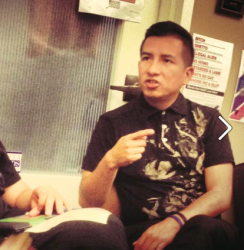
Ronnie Veliz immigrated to the U.S. from Peru when he was 17, and currently works as a community organizer with the East Bay Immigrant Youth Coalition. Photo courtesy of Ronnie Veliz.
David began school a few months after reuniting with his parents and was surprised when other students bullied him. He did not know any English and remembers them telling the teacher he was lying about the language barrier and spoke to them in English when the teacher was not around.
“It gave me the sense or introduction that people don’t like immigrants, even when they’re children,” he said. “So I knew I was going to have a hard time being an immigrant.”
David began to learn English through an ESL (English as a Second Language) program at school. He excelled in high school, making good grades and started his own clubs, including the LGBT and Folklorico (a traditional Latin dance) clubs.
Although these were the years he began coming out to people, he said it is a continual process.
“You don’t come out one time, you come out every day to different people,” he said. “I shouldn’t be ashamed of being undocumented and being gay because they are two identities, or intersectionalities, that belong to me.”
Intersectionality refers to how various biological and cultural factors come together to create social inequality. In David’s case, he isn’t just gay, undocumented or poor, all of these identities have come together to create multiple hurdles.
Social pressures in high school are often the first indication to the 3.5 million undocumented youth that they are different. While all their friends are getting drivers licenses, their first jobs and studying abroad for school, they cannot.
For David, this realization happened when he tried to apply to college.
“As I was going through the college applications, I wasn’t able to apply to many colleges because I was undocumented, and that’s when it truly made me feel like an undocumented person,” he said. “Before my senior year in high school I felt like a regular student, I never thought that I’d have problems with my financial aid, like FAFSA (Free Application for Federal Student Aid), or colleges would ask me for my social security number.”
Ronnie Veliz knows very well how difficult the transition can be. He immigrated to the U.S. from Peru when he was 17 and currently works as a community organizer with the <https://www.facebook.com/SFIYC”>East Bay Immigrant Youth Coalition and counseled people who are undocumented at Bienestar Familiar.
“I have seen undocumented youth turn into undocumented young adults, and I think the difference is when you’re in the immigrant child period you don’t know anything, you don’t know about U Visas, you don’t know about Green Cards, you don’t know about all these complications created by adults,” he said.
Since The California DREAM Act went into effect in 2012, David is now able to apply for state financial aid, and hopes to soon be a DACA recipient
Approximately 1.7 million people are eligible for DACA, in effect since 2012. Recipients are shielded from being deported, and given a temporary work permit. It has taken David a year to save up the $465 needed for the application fee and make the time to gather all the various documents required.
Although he has gone through a crash course in what it means to be undocumented the last few years, he has found strength through the struggles of being undocumented.
“In college I reclaimed the word, I made it part of who I am,” he said. “I figured out that if I’m undocumented and dealing with all these things they (documented citizens) don’t deal with, I feel like I need to be proud of it. I feel like now I’m proud of being undocumented and where I am.”
This pride has motivated David to become more active in the fight for change. He currently works in the External Vice Presidents Office at UCLA, where he and his coworkers work on campaigns and lobby for change at the national level. This year David plans to be a liaison between this office and IDEAS, Improving Dreams, Equality, Access and Success, the official voice of undocumented students at the campus.
Although David continues to become more active in his community, and open to those around him, he still cannot be as open as he would like with his own family.
“I still haven’t told them I’m gay because I still feel sheltered for the next two years because I’m in college, but later, when I graduate, if I still don’t have my papers, I don’t know what I’m going to do,” he said. “I feel like, at least I have my parents as a backup plan, or after college if I don’t find a job I can go back to their apartment and live with them and still be in the closet.”
Conservative estimates say at least 267,000, or 2.7 percent, of people who are undocumented in the U.S. are gay, according to The Williams Institute.
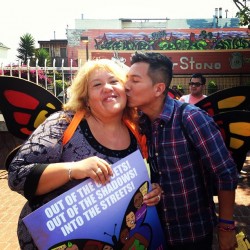
Ronnie Veliz next to Betty Andre, a DREAMer Mom and activist at the UndocuQueer press conference in San Francisco. Photo courtesy of Ronnie Veliz.
While many people who are undocumented face fears about their family members being deported, Veliz said those who are gay and undocumented have the additional burden of worrying about whether their family will accept them.
“Just like there is a double closet, there is a double fear on the way home, if there’s a home to go back to,” Veliz said.
While many people are out educating and fighting for the rights of people who are undocumented, Veliz said those who are undocumented and heterosexual will never deal with the same fears as those who are gay.
“They do deal with the fear of, will I get home today and see my parents there? But they don’t deal with the fear of, will I get home and be able to live there with my parents? That’s a different fear. It doesn’t only involve, will my parents be there, my siblings, my abuelita, will my grandpa be there, it involves, will they find out today? Will I be kicked out of my house today?”
Although David knows these struggles are real, he has found strength through fighting back.
“I know that although I’m being discriminated against, (but) there’s more to me than being undocumented. Sometimes I feel unwanted, but I don’t let that affect me, I’m just still proud.”
Tags: California Dream Act DACA double closet East Bay Interfaith Immigrant Coalition FAFSA IDEAS identity intersectionality Ronnie Veliz Unaccompanied minors undocumented students undocuqueer







